Stories from...2019
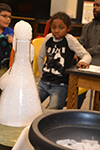 Uni High Students Bolster Local African-American Boys' Journey on the College Pipeline
Uni High Students Bolster Local African-American Boys' Journey on the College Pipeline
January 10, 2019
On December 12, a number of University Laboratory High School (Uni High) students from the Students for a Better World (S4BW) club stayed after school in hopes of making the world a better place for twenty or so local boys. Mostly African Americans, the young boys were from the DREAAM House (Driven to Reach Academic Achievement for Males) program. Part of the Uni-DREAAM Connect partnership, the after-school outreach has this as its short-term goal: to expose young boys to fun and exciting learning opportunities, as well as mentoring. Its long-term goal? To reinforce academics, thus improving the youngsters' achievement so they can successfully navigate the educational pipeline from kindergarten to college.
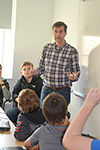 Cornerstone Christian Homeschoolers’ Students Design Infant Incubators Using POETS RET-Developed Curriculum
Cornerstone Christian Homeschoolers’ Students Design Infant Incubators Using POETS RET-Developed Curriculum
January 24, 2019
Over the last several months, 7th through 12th grade students who are a part of a home school support group, Cornerstone Christian Homeschoolers, have not only been learning some things about engineering and heat, but they have been discovering that engineers work to solve real-world problems. Using a POETS RET-developed curriculum, Joe Muskin, Education Coordinator for the NSF-funded POETS (Power Optimization for Electro-Thermal Systems) Engineering Research Center, has been working with the students who, after learning some of the science and engineering they might need to draw on, have been designing infant incubators for the developing world.
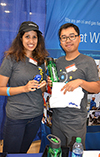 Looking to Find That Dream Job? Engineering Career Services and Its Upcoming Spring Engineering Career Fair Can Help
Looking to Find That Dream Job? Engineering Career Services and Its Upcoming Spring Engineering Career Fair Can Help
January 28, 2019
Start early! This is the pithy advice proffered by Engineering Career Services (ECS) job-hunt gurus Ulyssia Dennis and Lauren Stites. By “Start Early!” they mean that practically the second engineering students arrived back on campus after winter break, they should have roused themselves from their eggnog-and-holiday-goodie-induced fog and rushed right over to Engineering Career Services. Why? It’s time to get geared up for the spring Engineering Career Fair (ECF) on Jan 30–31.
When it comes to leveraging that shining new engineering degree into a much-coveted job in the not-too-distant future, Illinois engineering students should heed Dennis and Stites’ “Start early!” mantra. First, they recommend that students start focusing on finding that perfect job early in the semester by attending the spring Engineering Career Fair to be held at the ARC from 1:00 pm to 6:00 pm on Wednesday and Thursday, January 30th–31st.
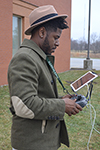 4H STEM Specialist Keith Jacobs Shares His Passion for Technology With Illinois Youth
4H STEM Specialist Keith Jacobs Shares His Passion for Technology With Illinois Youth
Feburary 6, 2019
Entrenched in front of a newly-acquired, huge flat-screen tv that serves as his computer monitor, and surrounded by his tech toys—myriad boxes of cutting-edge technology including drones, virtual reality headsets, and 3D printers courtesy of Google, Microsoft, and other tech giants—Illinois 4-H STEM Specialist Keith Jacobs imparts his tech savvy to youth all over the state. In his free time, he’s developing drones to provide medical services to folks in remote areas. And while these two passions might seem to be totally unrelated, they’re really quite interconnected.
For instance, when Jacobs was in college, he couldn’t quite decide what he wanted to do careerwise. So he dabbled in this and that, studying several seemingly disparate fields, which actually contributed to him getting to where he is today. After taking a rather round-about route, he’s presently doing two things he’s quite passionate about—developing medical drones and educating young people about STEM.
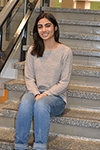 Bioengineering’s Saaniya Kapur Passionate About Biotech, STEM Outreach
Bioengineering’s Saaniya Kapur Passionate About Biotech, STEM Outreach
Feburary 8, 2019
Bioengineering freshman Saaniya Kapur’s parents never told her, “Oh, you're too young to do this!” Instead, Mom, who is preschool teacher, and Dad, who is a computer engineer, told her to go for it. So her early love of and exposure to science have shaped her dreams of a career in biotechnology. They have also fueled her passion for STEM outreach. Her goal? To give youngsters, as well as her peers, similar opportunities to fall in love with science the way she has.
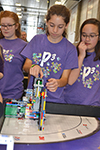 At FIRST Lego Championship, Illinois Youngsters Have a Blast Doing Robotics, Encountering Deep Space
At FIRST Lego Championship, Illinois Youngsters Have a Blast Doing Robotics, Encountering Deep Space
Feburary 12, 2019
After working for months to build then program their Lego Mindstorm robots to do space-related activities, 48 teams of 4th–8th graders (9–14-year-olds), including four local teams, showed up at the ARC on Saturday, January 26th, to compete in the FIRST Lego Championship for central and southern Illinois. The competition is sponsored by FIRST (For Inspiration and Recognition of Science and Technology) Robotics, and its partner Lego, (a foundation supporter), with support from its local partner, Engineering at Illinois. Along with robotics, the youth learned a bit about space; gained leadership, teambuilding, and communication skills; plus gained some core, life-long values.
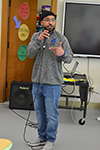 I-MRSEC, Champaign Educator Jamie Roundtree, Embrace Hip Hop/Rap to Reach Youth at Their Level
I-MRSEC, Champaign Educator Jamie Roundtree, Embrace Hip Hop/Rap to Reach Youth at Their Level
Feburary 14, 2019
“So if you can find value and show value for what students value, then they are going to find value in the things you are asking them to value.” – Jamie Roundtree
While some folks might insist that Hip Hop or rap doesn’t belong in the classroom, some of those involved with I-MRSEC’s Musical Magnetism curriculum, including Champaign Unit 4’s Director of Elementary Teaching and Learning, Jamie Roundtree, would disagree. They’re using the medium as a way to teach the students at Franklin STEAM Academy about, and get them engaged with, science—specifically magnetism. As part of the multidisciplinary curriculum, students are creating a rap song about one of a number of principles related to magnetism.
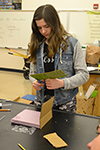 Monticello Teacher Exposes Students to the Engineering Process Via a POETS-RET-Developed Curriculum
Monticello Teacher Exposes Students to the Engineering Process Via a POETS-RET-Developed Curriculum
Feburary 20, 2019
For the last month or so, eighth graders in Jennifer Smith’s class at Monticello Middle School have been learning a whole lot about what being an engineer might be like. They’ve been designing infant incubators as part of a month-long curriculum Smith helped design when she participated in the POETS’ Research Experience for Teachers (RET). While doing so, they’ve not just learned some science and about the engineering process; they’ve experienced what working on a team is like.
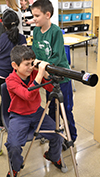 STEAM Studio AstroTech Unit Focuses on Telescopes Courtesy of Astronomy’s Wong
STEAM Studio AstroTech Unit Focuses on Telescopes Courtesy of Astronomy’s Wong
Feburary 22, 2019
When folks at STEAM Studio, Next Generation School's after-school program that emphasizes STEAM (Science, Technology, Engineering, and Math [STEM], plus Art) were planning a curriculum on Astro-Technology, they recalled that the father of one of their students was an astronomer. So it made perfect sense for Illinois Astronomy Professor, Tony Wong, to come and present to Kristi Hiatt’s Tera class (3rd–5th graders). During his visit, Wong didn’t get to share much about his research in molecular clouds, star formation, or the evolution of galaxies, but he did get to zero in on a tool he uses on a pretty regular basis: the telescope. And not only did the students learn about different kinds of telescopes and what they’re good for, they actually got to put together some Galileo telescopes and look through them to see what they could see.
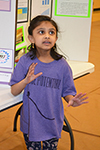 Next Generation School’s New-Look Science and Engineering Fair Imparts the Same Old In-Depth Learning and Life-Long Skills
Next Generation School’s New-Look Science and Engineering Fair Imparts the Same Old In-Depth Learning and Life-Long Skills
Feburary 28, 2019
"Courage to Be Curious," Next Generation School’s Science and Engineering Fair on February 15th, had a bit different look than in previous years—you could see from one end of the gym to the other! What was missing was the roomful of large display boards on which students had explained their research in the past. In their place were laptops, which the older kids (4th grade and up) used to present their research on websites they’d created using Weeble, an online platform. Other than that, it was exactly the same. As in previous years, it was the highlight of the year for scores of excited kids who presented to community experts. Also as in previous years, there was no 1st place winner, but every child was a winner as they learned more about their chosen topic, embraced the scientific method or engineering process, and gained communication skills…including learning how to make a website!
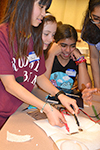 Middle School Girls Discover Engineering Is Fun During SWE’s Round Robin
Middle School Girls Discover Engineering Is Fun During SWE’s Round Robin
March 6, 2019
Nine 5th through 7th grade girls showed up on Saturday, February 23rd, for Engineering Round Robin, hosted by the Illinois chapter of Society of Women Engineers (SWE). The idea was to pique the girls’ interest in engineering by exposing them to some of the different engineering disciplines, plus to serve as role models for them to show them that girls can be engineers too.
When deciding on which disciplines they would expose the girls to, the organizers went with some of the most common fields of engineering, such as electrical and computer engineering, and mechanical engineering. However, Rose Carroll, the Round Robin coordinator who’s a freshman in agricultural and biological engineering, reports that in previous years, the event had done a lot of civil engineering activities, like bridge building, and she had wanted to change that up a bit. “I wanted to do something different,” she reports, “especially with me being in agricultural and biological engineering. There's not many activities that are incorporated into large-scale events like this.”
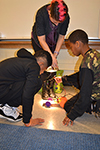 Becerra and Muskin Expose Wiley Fifth Graders to Engineering Via Fun Solar Projects
Becerra and Muskin Expose Wiley Fifth Graders to Engineering Via Fun Solar Projects
March 7, 2019
On most Tuesday mornings since the end of January, Tanissa Tutwiler's 5th grade class at Wiley Elementary has been learning some things about mechanical, electrical, even environmental engineering via some cool hands-on projects, including making a solar cell and designing a solar car. The activities were presented by a couple of Illinois staff who are passionate about STEM education: Natalie Becerra, who currently works as Extra Help for the Graduate Office in Academic Affairs, but who dreams of doing STEM outreach permanently, and Joe Muskin, the Education Coordinator of the Mechanical Science and Engineering Department.
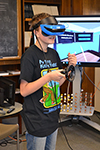 I-MRSEC’s Musical Magnetism Curriculum Uses Hip Hop to Teach Science
I-MRSEC’s Musical Magnetism Curriculum Uses Hip Hop to Teach Science
March 12, 2019
It’s not your mother’s science class…or music class, for that matter! The goal of I-MRSEC’s “Musical Magnetism” curriculum was to expose Franklin STEAM Academy eighth grade students to materials science and magnetism, but also to another of the center’s main emphases: scientific communication. What’s unique about the lesson plans is that they embraced a medium today’s kids can probably get into: hip hop or rap. So, after a number of Illinois researchers, students, and staff, who also served as role models, had exposed the students to multidisciplinary lessons in several related areas, the kids teamed up to create then present raps about specific areas of magnetism.
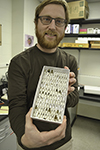 Entomology’s 2019 Insect Fear Film Festival Touts the Terrific Termite
Entomology’s 2019 Insect Fear Film Festival Touts the Terrific Termite
March 18, 2019
Lest anyone get the wrong idea about the 36th annual Insect Fear Film Festival (IFFF), the event wasn’t just to celebrate scary (or cheesy, perhaps?) movies about an insect. The February 23rd event was actually a love-fest celebrating insects, particularly the star of the evening, the termite. Sponsored by Entomology and the EGSA (Entomology Graduate Student Association), the goal of the evening was to help folks overcome their fear of insects, plus to educate them that not all insects are pests, but that many are actually useful. And of course, the overarching goal for the evening was for everyone to have fun.
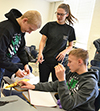 Clinton 4-H Group Visits Campus, Experiences STEM at Illinois
Clinton 4-H Group Visits Campus, Experiences STEM at Illinois
March 20, 2019
On March 4th, ten junior high and high school students, members of Clinton County’s 4-H Federation leadership group, traveled up from southern Illinois to spend the day on the Illinois campus. During their visit, they participated in STEM hands-on activities and briefly toured a number of campus buildings, including the IGB. While here, they were exposed to several STEM disciplines, dabbling a bit in Mechanical Engineering, Math, Aerospace Engineering, Molecular and Cellular Biology, and Entomology. Plus, they got to interact with a number of Illinois students to find out what being a student at Illinois might be like, as well as some possible career options.
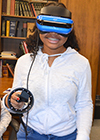 Franklin Steam Academy Students Experience High-Tech Science at MRL
Franklin Steam Academy Students Experience High-Tech Science at MRL
March 27, 2019
On February 25th, Franklin STEAM Academy eighth grade students took a break from their science textbook to experience some real-world, high-tech science first hand during a visit to MRL (the Materials Research Lab), home of I-MRSEC (the Illinois Materials Research Science and Engineering Center). The field trip was one of the highlights of I-MRSEC’s “Musical Magnetism,” a multi-disciplinary curriculum that used rap and music to expose students to materials science and magnetism. At MRL, the university folk pulled out all the stops, proudly introducing the youth to some of their million-dollar equipment and exposing them to some of the cool stuff they do—all while practicing another of I-MRSEC’s main emphases: scientific communication.
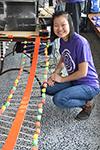 Engineering Open House Poised to Pique Students’ Interest in Engineering, Illinois
Engineering Open House Poised to Pique Students’ Interest in Engineering, Illinois
April 3, 2019
On March 8–9, thousands of visitors, including children and their parents, school field trips, and presenters, such as current Illinois engineering students and even alumni showed up to participate in Dare to Defy, the 2019 Engineering Open House. For the elementary and middle-school-aged visitors, it was a chance to learn more about science and engineering. (And let’s admit it, for students and even teachers, a day away from school is always fun.) For many high school students, it was a chance to discover what being an engineering student at Illinois might be like and possibly narrow down their career choices. For the many alumni and their industry colleagues who presented exhibits, it was a chance to display their products, share their experiences in engineering, and possibly get some young students interested in their field and maybe even their company. For all participants, it was a chance to celebrate engineering at Illinois.
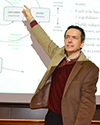 Via ENGINE, a Group of Illinois Educators Promote Using Playful Pedagogies to Engage Students
Via ENGINE, a Group of Illinois Educators Promote Using Playful Pedagogies to Engage Students
April 10, 2019
While Illinois students receive a good education and become highly sought after once they graduate, a group of Illinois faculty and educators believe faculty can do an even better job of engaging students. So a multidisciplinary team of educators with similar goals of improving education are collaborating in a new program called ENGINE: ENGagment In eNgineering Education, whose focus is for not just engineering faculty but all Illinois faculty to move beyond traditional teaching methods to explore a number of engaging new pedagogical strategies. A key objective, along with engaging students, is to share their passion for playful learning with other educators by developing resources then assessing the impact of these new teaching pedagogies to share with other faculty, both on campus and beyond.
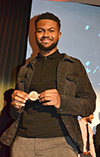 Health Make-a-Thon Encourages Local Citizens to Dream Up Ideas for Improving Health
Health Make-a-Thon Encourages Local Citizens to Dream Up Ideas for Improving Health
April 22, 2019
Dream it; make it! This pithy slogan epitomized the Carle Illinois College of Medicine’s (CI MED) recent Health Make-a-Thon, whose lofty goal was to democratize health innovation. The aim of the competition was to foster innovative ideas for improving human health by offering a huge incentive: a chance for contestants to win $10,000 in Health Maker Lab resources to create a real prototype of their idea.
Regarding the term “democratize,” Libby Kacich, the CI MED Communications and Marketing Director, explains it like this: “So, to bring literally anyone in Champaign County into a role of being empowered to bring ideas for improving health care to life.” Chemistry Professor Marty Burke, the College’s Associate Dean for Research, alludes to the “everything-I-need-to-know-I-learned-in-kindergarten” mentality, defining democratization as: “to invite everyone into the sandbox.”
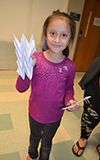 Cena y Ciencias Exposes Hispanic Elementary School Students to Materials Science at MRL
Cena y Ciencias Exposes Hispanic Elementary School Students to Materials Science at MRL
April 29, 2019
As part of I-MRSEC’s Cena y Ciencias (Spanish for “Supper and Science”) outreach program, a group of mostly Hispanic K–5 students and their families followed a supper of free pizza at Urbana’s Dr. Preston Williams Elementary School with a visit to the Materials Research Lab (MRL) for the second and equally-as-fun part of the evening—some science. During the April 1st event, the visitors not only participated in a variety of materials-related, hands-on activities, but they also got to interact with Illinois students and staff. Also, since many of those presenting were Hispanic and were leading the activities in Spanish, the youngsters also got to see scientists who look like them and who speak their language.
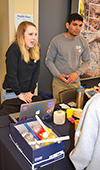 Design for America Espouses Human-Centered Design to Solve Unmet Needs
Design for America Espouses Human-Centered Design to Solve Unmet Needs
May 6, 2019
So you try something out and if it doesn’t work, stop doing it. If it is working, make it better and do it more. – Lucas O’Bryan on Design Thinking
The goal of the Illinois chapter of Design for America (DFA), according to its president, senior Lucas O'Bryan, is “to create local, social impact through projects that are focused on or partnered with community organizations.” So, through DFA, multidisciplinary teams of students seek to positively impact people’s lives by solving problems using the Human-Centered-Design Process.p>
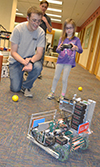 iRobotics Uses Robots to Get Local Youngsters Interested in STEM
iRobotics Uses Robots to Get Local Youngsters Interested in STEM
May 13, 2019
On April 1st, several local youngsters whose parents were participating in the Health Make-A-Thon got an up-close-and-personal introduction to robots courtesy of iRobotics, an Illinois RSO (Registered Student Organization) that seeks to spread its members’ passion for engineering and robotics to youth throughout the community. The children at the event not only watched these robots in action, but they even discovered some of the things the little machines can do firsthand when they got to hold the controllers and operate a couple themselves. The iRobotics students were hopeful that this early exposure to robotics might lead to an interest in STEM or even robotics down the road.
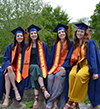 Female Industrial and Systems Engineering Graduates Poised to Make a Difference
Female Industrial and Systems Engineering Graduates Poised to Make a Difference
May 17, 2019
Ready. Set. Go! It’s May, and a new batch of Illinois engineers, including Siobhan Fox and Frances, Teresa, and Mary Ponicki, with whom I-STEM has had significant interactions during their tenure at Illinois, are chomping at the bit to go out and change the world. The top of their respective high school classes, upon arriving on campus as freshmen, they discovered that it was a whole new ball game. They all experienced failure in one form or another, or encountered challenges that they had to work to overcome. But through the community here at Illinois, including some amazing Engineering professors, they overcame those challenges and have emerged prepared for the future—well-trained, inspired, and excited to use their knowledge and skills to problem solve and to make the world a better place.
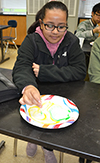 MCBees Share Their Passion for Science With Jefferson Middle School Students
MCBees Share Their Passion for Science With Jefferson Middle School Students
May 21, 2019
Thanks to the MCBees, Jefferson Middle School eighth graders learned about some basic science topics in spring 2019, such as cells and the pH scale. A couple of times a month from February through May 2019, nine members of Illinois’ School of Molecular and Cellular Biology (MCB) graduate student organization dropped by Elizabeth Wheatman’s and Sammy Yoo’s classes to lead students in some fun, STEM hands-on activities. The MCB Ph.D students (and postdocs) hoped to pique the younger students’ interest in science and possibly add some diversity to the field. Plus, the eighth graders weren’t the only ones to benefit; the scientists themselves got a lot out of the partnership. Some just enjoyed getting out of the lab for a bit, and others were reminded why they had become passionate about science in the first place.
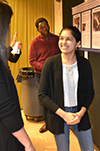 POETS Young Scholars Program Attracts High Schoolers to Research
POETS Young Scholars Program Attracts High Schoolers to Research
May 28, 2019
POETS’ Young Scholars program does just what its name implies—it gives high school students the opportunity to engage in scholarly pursuits—conduct research and learn what it means to be part of a research team—just like their older counterparts. In fact, they’ve even gotten to present their research in a number of venues, including Young Scholars’ end-of-summer poster session, at the Emerging Researchers National Conference (ERN), and most recently, to the Champaign School Board. And for three local youth who have been a part of the program, Neha Hebbar, Darius Jackson, and Kerene Kombe, this extensive exposure to academia has pretty much sealed the deal: at least two of them want to continue the research path they’ve been pursuing once they get to college, and maybe even further.
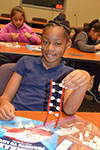 CPLC’s BESO Program Teaches International Prep Academy Students About DNA…in Spanish
CPLC’s BESO Program Teaches International Prep Academy Students About DNA…in Spanish
June 4, 2019
On Thursday morning, May 16th, Ms. Jenkin’s and Ms. Jones’ third grade students from Champaign’s International Prep Academy (IPA) took a field trip to the NCSA as part of the BESO (Bilingual Engineering and Science Outreach) program run by the Center for the Physics of Living Cells (CPLC). The main theme for the day was DNA, with groups of students rotating through several STEM activities. But what was especially unique about the day was that most of the activities were conducted in Spanish.
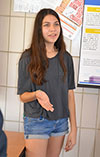 Uni High Sophomores Build Infant Incubators Courtesy of POETS-RET-Developed Curriculum
Uni High Sophomores Build Infant Incubators Courtesy of POETS-RET-Developed Curriculum
June 11, 2019
During the spring semester, as a part of the POETS RET program’s ongoing curriculum development, University Laboratory High School (Uni High) students in science teacher David Bergandine’s chemistry classes tried out POETS’ Infant Incubator curriculum. Here's the scenario: students were to develop an infant incubator which could be used in the developing world in places where folks often can't use electricity. And because this was for a chemistry class, they were to use a chemical reaction to generate heat. Also as part of the curriculum, they were to create a poster and present at an end-of-the semester poster session, complete with judges and prizes.
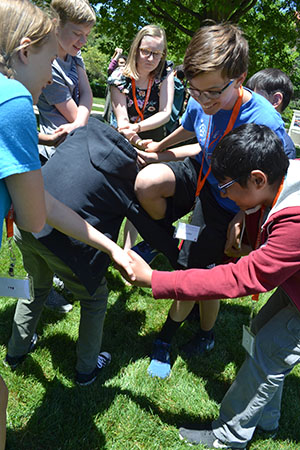 SIM Campers Experience “Ah-ha! Moments” Over the Beauty, Complexity, Oft-Misunderstood Nature...and Fun...of Mathematics
SIM Campers Experience “Ah-ha! Moments” Over the Beauty, Complexity, Oft-Misunderstood Nature...and Fun...of Mathematics
June 14, 2019
“What is the point of this?!” a middle school student asked several of the 22 Summer Illinois Math (SIM) Camp Epsilon participants during an activity on the first day of week-long day camp which ran from June 10–14th. Tied into a “human knot,” he and several of his fellow campers were trying to get untangled. Here’s how they got in this predicament: they stood in a circle facing each other; each raised their right hand and took the hand of someone across from them, then took another’s hand with their free hand. The goal? To untangle the knot without letting go of each other’s hands, deciding which players should go over, under, backwards, or forwards until they all ended up in a single circle, still holding hands.
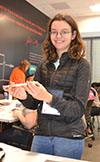 2019 GLEE Camp Exposes High School Students to Electrical Engineering Via Hands-On Projects
2019 GLEE Camp Exposes High School Students to Electrical Engineering Via Hands-On Projects
June 24, 2019
Electrical and Computer Engineering's (ECE) GLEE camp recently celebrated its tenth successful year of operation. Familiar faces, such as ECE Professor Lynford Goddard and a team of ECE students and faculty, returned to serve as instructors for the 2019 camp. Previously, the camp was exclusively for girls, however, this year, GLEE opened up and welcomed students of all genders. Nineteen girls and two boys from east-central Illinois, the Chicago area, and even two from out of state experienced a high-quality program with exposure to what studying Electrical and Computer Engineering at Illinois is like.
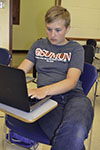 The Illinois Geometry Lab Partners with Uni High to Expose Students to Research
The Illinois Geometry Lab Partners with Uni High to Expose Students to Research
June 28, 2019
For the second summer in a row, the Illinois Geometry Lab (IGL) in the Department of Mathematics partnered with University Laboratory High School (Uni High) to provide research projects for some of the school’s students. For four weeks from June 3rd through June 28th, 15 high schoolers visited Altgeld Hall to conduct math research, mentored by Illinois Math graduate students. The idea was to expose the younger students to math not traditionally taught in school and also to give them a taste of what math research is like. In addition, the younger students experienced another aspect of academia: they prepared presentations then presented their research at a final symposium on Thursday, June 27th.
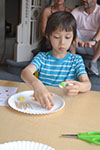 Local Children “Make” Nanodiamond Molecules at the Orpheum Courtesy of MechSE Professor Lili Cai
Local Children “Make” Nanodiamond Molecules at the Orpheum Courtesy of MechSE Professor Lili Cai
July 1, 2019
While making a “molecule” with toothpicks and gummy bears might just seem like a fun (and tasty?) pastime on a Saturday afternoon, the children participating in the activity at Champaign’s Orpheum Children’s Science Museum on June 29th were actually learning a bit about nanotechnology—to be specific—about nanodiamonds. The activity, presented by MechSE Assistant Professor Lili Cai, was related to one of her research areas: using a flame-based process to manufacture advanced nanomaterials. Cai is submitting an NSF Career grant proposal in January 2020, so in preparation, she has been implementing various research-related outreach activities that will fulfill NSF’s outreach component. Plus, in addition to the June 29th nanodiamond activity, on July 11th, she’ll be presenting an activity to high school students participating in one of Illinois’ Worldwide Youth in Science and Engineering (WYSE) summer camps. their research at a final symposium on Thursday, June 27th.
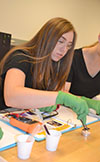 GLAM Campers Explore Materials, What Studying Materials Engineering is Like
GLAM Campers Explore Materials, What Studying Materials Engineering is Like
July 31, 2019
Eighteen female high school students from Illinois, and even a couple from the east coast (New Jersey and Connecticut) were on campus the week of July 7–13 to participate in the 2019 edition of Girls Learn About Materials (GLAM). In addition to learning about a variety of different materials, teams of students completed design projects targeting specific materials, during which they learned more about their material and even designed a prototype using it. They also honed their presentation skills by creating and presenting a poster at the end-of-the-week poster session. A final goal of the camp was to foster interactions between the campers and female students majoring in Materials Science.
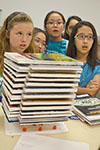 Middle School Girls Learn About Materials While Doing Cool Hands-On Activities to “Make Stuff Better”
Middle School Girls Learn About Materials While Doing Cool Hands-On Activities to “Make Stuff Better”
“I do this, and I will always do this because I think that this is a very crucial age group.” Cecelia Leal on why she does the Mid-GLAM camp.
August 5, 2019
Twenty-two middle schoolers showed up on campus from July 15–19 for Mid-GLAM, a summer day camp designed to pique middle school girls’ interest in materials engineering. In its third year, the camp, led by Materials Science and Engineering (MatSE) Assistant Professors Cecelia Leal and Robert Maass, introduced girls to materials via fun, hands-on activities.
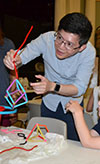 MechSE’s Feng Uses Bubbles to Teach Fluids Principles, Pique Students’ Interest in STEM
MechSE’s Feng Uses Bubbles to Teach Fluids Principles, Pique Students’ Interest in STEM
If good people who know a concept well don't pass that knowledge on to the next generation, then that knowledge could be lost. – Jie Feng’s Princeton PhD advisor, Professor Howard Stone
August 9, 2019
The above paradigm, which (Mechanical Science and Engineering (MechSE) Assistant Professor Jie Feng picked up from his Princeton Ph.D. advisor, has helped to fuel his love of STEM education outreach. So, lest some of his knowledge about bubbles be lost, this summer, Feng and some assistants, including Adriana Coariti, an Assistant Project Coordinator and Research Scholar at NCSA's Nano Manufacturing Node, shared concepts about his research with some young people. The students ranged in ages from high schoolers participating in the MechSE portion of the WYSE (Worldwide Youth in Science and Engineering) camp on July 12, down to early primary school students at the Creative Science Camp of the Orpheum Children’s Science Museum on July 15th.
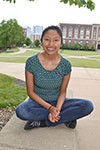 Adriana Coariti Passionate About STEM Outreach, Cooking Up a Multidisciplinary Masterpiece
Adriana Coariti Passionate About STEM Outreach, Cooking Up a Multidisciplinary Masterpiece
“I love multidisciplinary work. I think that brings the best of every world together. It's like cooking. You get all of your best ingredients, and if you know some type of cuisine and you can combine it with another, you can cook something great.” – Adriana Coariti
August 8, 2019
When high schoolers in the WYSE (Worldwide Youth in Science and Engineering) camp were struggling with how to insert a bubble inside another bubble, Adriana Coariti was there to help the students trouble shoot. And when youngsters at the Orpheum Children’s Science Museum’s Creative Science Camp couldn’t get the wand they’d designed to make rectangular bubbles, she was by their side, effervescently encouraging them to follow their intuition. Extremely passionate about multidisciplinary engineering, Coariti is just as passionate about STEM outreach. So she got involved with the two summer 2019 outreach opportunities in hopes of helping the youth build their scientific intuition.
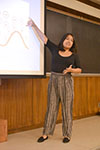 I-MRSEC REU Exposes Undergrads to Materials Science, Research, and What Grad School Is Like
I-MRSEC REU Exposes Undergrads to Materials Science, Research, and What Grad School Is Like
August 20, 2019
For ten weeks this past summer, eleven undergraduate students from all over the US showed up at Illinois to participate in I-MRSEC’s second Research Experience for Undergraduates (REU) program. As part of the experience, they not only conducted a research project, but they completed a paper and gave a final presentation. Of the 11 students, five were from Illinois (mostly from the Chicago area); six were from out of state (Tennessee, Oregon, Texas, and California). And although none of them are currently Illinois students, after experiencing what cutting-edge research at Illinois is like, some will most likely be applying to grad school here.
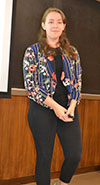 I-MRSEC REU Teaches Carmen Paquette a Lot About Magnetism, Research, and Herself
I-MRSEC REU Teaches Carmen Paquette a Lot About Magnetism, Research, and Herself
August 23, 2019
Carmen Paquette had a lot of takeaways from her experience in the I-MRSEC (Illinois Materials Research Science and Engineering Center) Research Experience for Undergraduates (REU) this past summer. For one, the rising junior, a Material Science and Engineering major at the Illinois Institute of Technology in Chicago, learned a lot about both magnetism and material science. She also discovered what engineering research is like—lots of iterations and lots of thinking outside the box. She also grew personally, learning not to procrastinate, but to “Just do it!” And while she didn’t necessarily figure out if grad school is in her future, she did decide to just follow her heart and go full STEAM ahead when it comes to the things she’s passionate about.
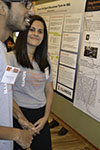 INCLUSION REU Exposes Undergrads to Computational Research Using Open Source Software
INCLUSION REU Exposes Undergrads to Computational Research Using Open Source Software
August 29, 2019
In the summer of 2019, eleven undergraduate students experienced a computationally-based summer research experience as a part of the National Center for Supercomputing Applications’ (NCSA) NSF-funded INCLUSION (Incubating a New Community of Leaders Using Software, Inclusion, Innovation, Interdisciplinary and OpeN-Science) Research Experience for Undergraduates (REU). In its third and final year, the REU allowed the students to acquire or improve their coding skills, possibly even learning a new programming language as they completed projects using Open Source Software. In addition to finding out what research is like, they also experienced another activity they will most likely use should they end up in grad school: they created posters then presented their research. Some of the students also figured out what their next step might be careerwise: matriculating to Illinois to further their education. Plus, the participants also made some relationships and did some networking.
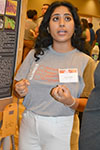 Biomedical Imaging REU Helps Undergrads Make Educated Decisions About Grad School
Biomedical Imaging REU Helps Undergrads Make Educated Decisions About Grad School
August 29, 2019
In its fifth year, the NSF-funded Biomedical Imaging REU brought ten undergraduate students from across the country, even Puerto Rico, to Illinois to expose them to the idea that studying biomedical engineering in graduate school might be a viable direction for their future. Through the REU, they discovered how rewarding research can be, gained poster-making and oral presentation skills, built relationships with peers on a similar career track, and even networked for the future.
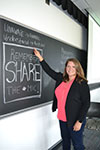 Meagan Pollock Encourages CISTEME365 Educators to Reach and Teach Every Student
Meagan Pollock Encourages CISTEME365 Educators to Reach and Teach Every Student
September 4, 2019
As part of the NSF grant, Catalyzing Inclusive STEM Experiences All Year Round (CISTEME365), 15 teachers from five schools visited Illinois for the first CISTEME365 workshop. Their goal was to receive training needed to begin after-school STEM clubs in their schools. Because CISTEME365 is targeting students often underserved in STEM, including women and minorities, the first week’s emphasis was equity training taught by Meagan Pollock of the National Alliance for Partnerships in Equity (NAPE). The message of the week-long institute was simple: reach and teach every student.
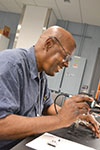 CISTEME365 Seeks to Increase Underrepresented in STEM—Trains Teachers to Start STEM Clubs
CISTEME365 Seeks to Increase Underrepresented in STEM—Trains Teachers to Start STEM Clubs
September 10, 2019
According to statistics, women and minorities are underrepresented in STEM (Science, Technology, Engineering, and Math). So, for years, Electrical and Computer Engineering (ECE) Professor Lynford Goddard has been exposing high school girls, including minorities, to electrical engineering via cutting-edge-yet-fun hands-on activities in his GLEE (Girls Learn Electrical Engineering) camp, which, to foster inclusion, included boys as well this past summer. Now, he hopes to significantly increase the number of high schoolers he impacts annually from the 21 or so he’s been working with in GLEE, to significantly more than that—at least 1,000—through his 3-year NSF grant, Catalyzing Inclusive STEM Experiences All Year Round (CISTEME365). Plus, Goddard hopes to pass on not just some of his expertise, but the materials he’s developed over the years, to teachers who will use what they learn to begin after-school STEM programs.
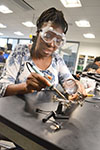 Five Schools Tap into CISTEME365 Resources to Begin STEM Clubs, Pique Student Interest in STEM
Five Schools Tap into CISTEME365 Resources to Begin STEM Clubs, Pique Student Interest in STEM
September 12, 2019
With the goal of increasing the number of their students, especially girls and minorities, who become interested in, and possibly choose careers in STEM (Science, Technology, Engineering, and Mathematics), 13 teachers from five schools are participating in Electrical and Computer Engineering’s new NSF-funded grant, CISTEME365 (Catalyzing Inclusive STEM Experiences All Year Round). The main objective of the program is for the educators to begin after-school STEM clubs in their schools. As part of the program, for two weeks this past summer, from July 22–August 3, 2019, the schools sent Idea Teams to campus for the first CISTEME365 Institute. There, the educators learned how to foster equity and inclusion, tried out hands-on activities that would expose students in their clubs to STEM, and networked with other educators excited about STEM.
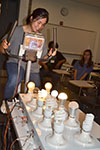 Banerjee and Bose Empower/Recharge Educators During CISTEME365 Session About Power and Energy
Banerjee and Bose Empower/Recharge Educators During CISTEME365 Session About Power and Energy
September 16, 2019
In the recent CISTEME365 Institute from July 22–August 3, 2019, two rising stars in Electrical and Computer Engineering (ECE), Assistant Professors Subhonmesh Bose and Arijit Banerjee, presented a session on their areas of research—power and energy— to 13 educators participating in the institute. Part of the 3-year NSF grant, Catalyzing Inclusive STEM Experiences All Year Round CISTEME365, their integrated presentation walked through a history of power systems, the physics behind electromechanical energy conversion, and shared research frontiers in power and energy. Plus, a dialogue ensued where both the K–12 and higher education teachers discussed STEM pedagogy beneficial for all ages.
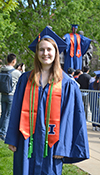 Aerospace Engineering's Katie Carroll: Poised to Explore Andromeda…and Beyond
Aerospace Engineering's Katie Carroll: Poised to Explore Andromeda…and Beyond
September 17, 2019
When someone graduates, it’s usually a poignant mix of nostalgic reflection on the past and a hopeful gaze into the future. In May 2019, Katie Carroll graduated from Aerospace Engineering. And just as this writer couldn’t help but do an article about Carroll’s voyage down the STEM pipeline when she was a freshman, I felt it was only fitting that I close the chapter on her time at Illinois with a walk down memory lane, looking at the things she considered most significant in her past, and a bit of a look into what’s in her future.
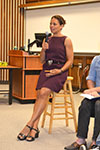 Via I-MRSEC’s Magnetic Fields Web Series, Young People Learn About Magnetism, Experience Diversity in Science
Via I-MRSEC’s Magnetic Fields Web Series, Young People Learn About Magnetism, Experience Diversity in Science
September 19, 2019
Armed with real theater popcorn and other goodies, the audience at the August 1st screening party settled back to enjoy Magnetic Fields, a four-part web series developed by I-MRSEC (the Illinois Materials Research Science and Engineering Center) as part of its mandate to communicate about Materials Science—in this case, about magnetism. Using a fun plot, plus actors the targeted audience of young people could identify with, the series sought to capture their interest, possibly directing them along the STEM pipeline into materials engineering. The cast of young actors seated in the front row, excited to see themselves on the “big screen,” reflected the diversity I-MRSEC hopes to foster in the field. Also in the audience, proudly viewing their creation, were the director, John Isberg as well as I-MRSEC’s PI, Nadya Mason, and Outreach Coordinator, Pamela Pena Martin.
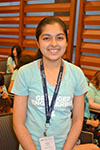 Fall 2019 WIE Orientation Introduces Engineering Freshmen Women to a Support System, Possibly Life-Long Friends
Fall 2019 WIE Orientation Introduces Engineering Freshmen Women to a Support System, Possibly Life-Long Friends
September 27, 2019
Simplicity. That was how the planners of the Women in Engineering (WIE) Orientation described their event for incoming female freshman engineering students. Their goal? To provide the same awesome program as in previous years—but condensed: only the evening of Wednesday, August 21st and all day Thursday the 22nd. Orientation sought to: introduce freshmen to their departments and to campus resources and where they could be found; provide sage advice, including from keynote speakers Ann Zuzuly and Valerie Laguna; and foster community-building, both with fellow freshmen and with mentors—older and wiser female engineering students who had successfully navigated the many challenges freshmen face. Of course, the icing on the cake was early move-in, avoiding the insanity of all-campus move-in day.
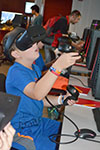 The Next Best Thing to Being There—STEAM Studio Youngsters Explore the Amazon with the Help of CITL
The Next Best Thing to Being There—STEAM Studio Youngsters Explore the Amazon with the Help of CITL
October 3, 2019
Here’s the scenario. On their way home from a gecko conference, their plane crashed in the Amazon, where they had to survive in the unfamiliar, somewhat hostile environment and to figure out how to return home using GPS technology. This scenario was part of a 6–8 week unit about the Amazon Rain Forest that third graders in Next Generation School’s STEAM Studio after-school program did this fall. Activities included studying geckos and building tents for shelter. Plus, to enhance their experience, they visited CITL’s (Center for Innovation in Teaching & Learning) Armory Innovation Spaces: Innovation Studio and TechHub. There, armed with VR goggles, they zoomed in on the Amazon using Google Earth, watched YouTube 360 videos to experience the rain forest, and even laser printed luggage tags. Immersed in such fun, creative, and high-tech activities to study the Amazon, what student couldn’t help but learn?
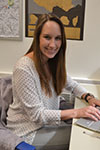 Thrasher Studies the Use of Low-Stress Virtual Reality to Improve Students’ French Oral Proficiency
Thrasher Studies the Use of Low-Stress Virtual Reality to Improve Students’ French Oral Proficiency
October 11, 2019
Can virtual reality (VR) be used to decrease foreign language anxiety and increase students’ oral proficiency? French PhD student Tricia Thrasher thinks so. Consequently, students in French 205 were slated to employ VR in the Center for Innovation in Teaching & Learning’s (CITL’s) Innovation Studio, providing the perfect opportunity for her to study the impact. According to Thrasher, who has a concentration in Second Language Acquisition and Teacher Education (SLATE), foreign language anxiety has been shown to negatively impact oral production skills. So, for her dissertation, she’s studying oral proficiency, specifically looking at how VR can be used to decrease foreign language anxiety, thus increasing oral production performance.
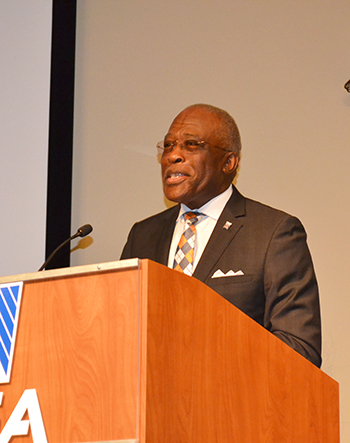 Statewide K-12 CS Education Summit Seeks to Jump Start Computer Science Education in Illinois
Statewide K-12 CS Education Summit Seeks to Jump Start Computer Science Education in Illinois
October 16, 2019
Computers are here to stay—an integral part of our society. If the state of Illinois is going to keep up with the rest of the world, the next generation needs to learn not just how to use them, but how to program them.
Folks from around the state who are passionate about computer science (CS) education and adhere to the above philosophy gathered at NCSA (the National Center for Supercomputing Applications) on September 20th for the first Illinois Statewide K–12 CS Education Summit. The goal of the many participants was to become better informed about how to begin a CS program, to network with like-minded stakeholders, and to draft a state plan for CS education.
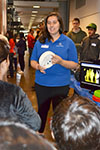 Fall 2019 Illinois Space Day Is Out of This World
Fall 2019 Illinois Space Day Is Out of This World
October 18, 2019
Would you like to blast off on a rocket ship some day to explore outer space? Doubless some of the around 200 people who showed up for Illinois Space Day (ISD) uon October 5th would. Among the 150+ visitors to the event at the Digital Computing Lab were some local teachers, parents, and lots of K–8th grade students—possibly with some future aerospace engineers or maybe even an astronaut or two among them. Also on hand were numerous Illinois Aerospace Engineering students, sporting t-shirts emblazoned with “The 50th anniversary of the Moon Landing!” to celebrate one of Man's most important forrays into space and the theme of the Day: the Apollo 11 mission. The Aerospace students’ goal in participating in the event was to not just share their passion for space with the young visitors, but also to possibly recruit some into aerospace engineering down the road, or to help pique the interest of a future astronaut.
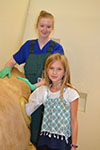 Veterinary Medicine Students Share All About Animals With Vet Med Open House Visitors
Veterinary Medicine Students Share All About Animals With Vet Med Open House Visitors
October 22, 2019
Pet a horse, a piglet, a bird, even a tarantula. Milk a cow. Get your favorite animal painted on your face. Conduct “surgery” on your stuffed animal. Stick your hand inside a fistulated cow. Feel the inside of some real horse’s intestines (outside of the horse who donated them, of course). These were some of the numerous fun yet education activities available to the many visitors who showed up at Veterinary Medicine’s Open House on Sunday, October the 6th. Organized, and run by current veterinary medicine (vet med) students, they staffed the various offerings, proudly talking to visitors about their exhibits, what being a veterinary student at Illinois is like, and answering a plethora of questions that curious visitors, both young and old, were asking about animals. Plus, for high school students who might be considering becoming veterinarians, it’s “a really cool way for them to see all of the programs and opportunities that our college has to offer!” explains third year vet med student Chelsea Santa Lucia.
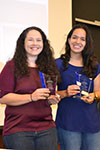 Illinois Alums Laguna and Zuzuly Encourage Women in Engineering During WIE Orientation
Illinois Alums Laguna and Zuzuly Encourage Women in Engineering During WIE Orientation
October 23, 2019
BFFs. Best friends forever. Even though Illinois alums Val Laguna and Ann Zuzuly graduated from Mechanical Science and Engineering six years ago, the close friendship they developed while here at Illinois is still intact. And though they now live and work several states apart, they still get together periodically to catch up. One of those times, probably the highlight of the summer for both, was coming back to their old stomping grounds to co-present as Keynote Speakers at the 2019 WIE Orientation in late August. There they had a chance to catch up with some old friends, encourage the next generation of women engineers, and possibly even recruit a few to their current companies as well.
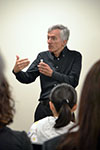 I-MRSEC’s Principiae Workshop Targets Improving Researchers’ Presentation Skills
I-MRSEC’s Principiae Workshop Targets Improving Researchers’ Presentation Skills
October 29, 2019
Why attend a workshop about giving oral presentations? One participant who’d performed numerous calculations for his research, hoped to figure out which to include in his presentations. Another hoped to take her presentations to the next level—go from just good to great. A third participant admitted that while she loved giving presentations, her body didn’t; she would shake, sweat, and have trouble breathing. These were some of the reasons the 25 or so participants gave for attending the “Making the Most of Your Presentation” workshop hosted by the Illinois Materials Research Science and Engineering Center (I-MRSEC) on October 10. Presented by Jean-luc Doumont from Principiae, the workshop focused on this goal: to train researchers to better communicate their science.
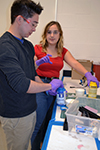 Bioengineering’s Golecki Uses Soft Robotics to Hook Students on Biomedical Engineering…STEM
Bioengineering’s Golecki Uses Soft Robotics to Hook Students on Biomedical Engineering…STEM
November 13, 2019
Working with students—opening their eyes to the possibilities—empowering students to believe that they deserve a seat at the table is really important to me.” – Holly Golecki
Holly Golecki, a new Bioengineering (BioE) Assistant Professor, is passionate about biomedical engineering, soft robotics, and using the two to pique young people’s interest in STEM. She’s particularly interested in steering girls onto the engineering pipeline.“I want to empower women and young girls to feel like they deserve a seat at the table in any engineering discipline,” she explains.
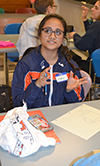 SWE’s 2019 IGED Introduces Illinois Girls to Engineering
SWE’s 2019 IGED Introduces Illinois Girls to Engineering
November 15, 2019
At SWE’s 2019 Introduce-a Girl-to-Engineering Day (IGED) on October 26th, Illinois engineering students who participated in the all-day event did just what its name implies. They acquainted around 110 high school girls (the most to ever participate in the event), with what different engineering disciplines are like, what careers are available in the different fields, and what studying engineering at Illinois might be like. Sponsored by SWE Illinois (the Society for Women Engineers) on campus, the event did more than just introduce the girls to the different engineering disciplines; it also gave them a chance to interact with Illinois engineering students. Meanwhile, their parents (around 100 or so) hung around to find out about the admissions process, talk to current upperclassmen, and get a feel for what studying at Illinois might be like for their daughters.
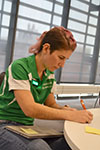 STEM OPEN Unconference Fosters Networking Among Campus STEM Outreach Folks
STEM OPEN Unconference Fosters Networking Among Campus STEM Outreach Folks
November 20, 2019
Why hold a campus event about STEM outreach and public engagement? The recent STEM OPEN (Outreach & Public Engagement Network) Unconference sought to do just what the name of the group implies: to allow STEM outreach and public engagement folk to network. So on Nov 8, 2019, around 23 experts from the university community, as well as Parkland, got together to build a network and to share ideas and expertise related to an area they’re all passionate about: STEM outreach and public engagement.
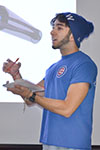 Bioengineering Design-a-thon Gives Students a Head Start in Designing Medical Products
Bioengineering Design-a-thon Gives Students a Head Start in Designing Medical Products
November 25, 2019
Bioengineering students who dream of designing medical products in the future got a taste of what it’s like during Bioengineering’s recent Design-a-thon on Friday–Saturday, November 8th–9th. Winners received prizes that anyone would love with the holidays looming: Amazon gift cards. However, while winning a prize was obviously an incentive, many students actually got involved for the design thinking training and to gain expertise in 3D CAD (computer-aided design), specifically Autodesk Fusion 360. Of course, for some, the main incentive was the thrill of competition.
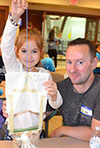 At Dads 4 Daughters, Father-Daughter Duos Have Fun with STEM
At Dads 4 Daughters, Father-Daughter Duos Have Fun with STEM
December 3, 2019
It was a chance for Daddy to take his little girl on a date that was both fun and educational. So on Saturday, November 16, the Illinois chapter of SWE (the Society of Women in Engineering) hosted Dads 4 Daughters, where 31 father figures (mostly dads, plus a grandfather or two) accompanied 31 girls, ages 5–7 (Kindergarten to second grade) to a great day bonding over STEM (science, technology, engineering, and math).
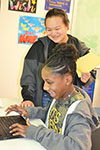 Using Lasers Enlightens Judah Christian School Students About Coordinate Math
Using Lasers Enlightens Judah Christian School Students About Coordinate Math
December 12, 2019
Rather than just poring over a math textbook studying coordinates, or simply using graph paper to map them out, students at Judah Christian School used cutting-edge technology to learn about coordinates, courtesy of University of Illinois master teachers Joe Muskin and Adam Poetzel. On Thursday, November 21st, students from 11 different classes used coordinate math to design shapes which they then displayed using laser light shows. Not only was the activity educational and fun, but students would most likely never forget what they’d learned about coordinates. For example, as one student, Piper Hawk admitted: “You’ve gotta’ be specific with it.”
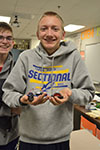 MSHS STEM Club Seeks to Pique High Schoolers’ Interest in STEM Via Hands-on Activities, Exploring STEM Careers
MSHS STEM Club Seeks to Pique High Schoolers’ Interest in STEM Via Hands-on Activities, Exploring STEM Careers
December 17, 2019
What’s something that teenagers might find so exciting that they’d roust themselves out of bed early on a Monday morning in order to show up at school by 7:15 AM? STEM! To be specific, the Mahomet-Seymour High School (MHSH) STEM Club, which has met every Monday morning since it was begun in late August, exposing between 15–25 young people to STEM hands-on activities and STEM careers each week.
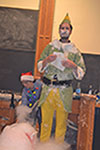 Chemistry Holiday Magic Show Demonstrates That Science Can Be Both Magic...and Fun!
Chemistry Holiday Magic Show Demonstrates That Science Can Be Both Magic...and Fun!
December 20, 2019
“It’s not magic…it’s science! This was the chant Illinois Chemistry professor Don DeCoste had the audience repeat periodically during the Saturday, December 14th edition of Chemistry’s long-standing holiday tradition, the Holiday Magic Show. The plethora of pyrotechnic demos produced exothermic chemical reactions—heat, light, gas, smoke, and/or sound. The constant barrage of demos featuring fire, fireworks, explosions, and lots of liquid nitrogen had members of the audience laughing, clapping, sticking their fingers in their ears, evading soap suds explosions, and vowing to go home and try to figure out what made some of the reactions do what they did.













.jpg)
















